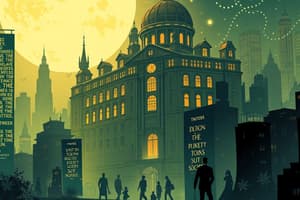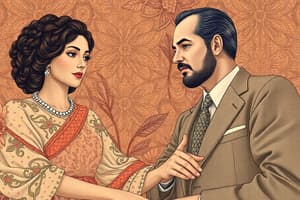Podcast
Questions and Answers
Which of the following best describes the primary goal of Lyndon B. Johnson's 'Great Society' agenda?
Which of the following best describes the primary goal of Lyndon B. Johnson's 'Great Society' agenda?
- To decrease the size and scope of the federal government.
- To increase military spending and expand the U.S.military presence globally.
- To focus solely on civil rights legislation and ignore economic disparities.
- To reduce poverty, promote racial equality, and improve education and healthcare. (correct)
The Voting Rights Act of 1965 aimed to eliminate what?
The Voting Rights Act of 1965 aimed to eliminate what?
- Discriminatory voting practices, particularly those affecting African Americans. (correct)
- Restrictions on women's suffrage.
- The electoral college system.
- Property ownership requirements for voting.
How did President Johnson justify U.S. involvement in the Vietnam War in his addresses to the nation?
How did President Johnson justify U.S. involvement in the Vietnam War in his addresses to the nation?
- As a response to direct military aggression against the United States.
- As a means to secure economic advantages in Southeast Asia.
- As a necessary measure to contain the spread of communism. (correct)
- As an effort to establish a democratic government in North Vietnam.
What is the significance of Lyndon B. Johnson's use of the phrase "And we shall overcome" in his March 15, 1965 speech?
What is the significance of Lyndon B. Johnson's use of the phrase "And we shall overcome" in his March 15, 1965 speech?
Which of the following federal programs was NOT a key component of Johnson's 'War on Poverty'?
Which of the following federal programs was NOT a key component of Johnson's 'War on Poverty'?
How did the Civil Rights Act of 1964 address discrimination?
How did the Civil Rights Act of 1964 address discrimination?
What was a significant consequence of Johnson's escalation of U.S. military involvement in the Vietnam War?
What was a significant consequence of Johnson's escalation of U.S. military involvement in the Vietnam War?
Which of the following themes was a consistent focus throughout many of President Johnson's speeches?
Which of the following themes was a consistent focus throughout many of President Johnson's speeches?
Flashcards
The Great Society
The Great Society
LBJ's domestic program focused on poverty reduction, racial equality, education, and healthcare improvements.
Medicare and Medicaid
Medicare and Medicaid
Health insurance for the elderly and low-income individuals, key parts of the Great Society.
Elementary and Secondary Education Act
Elementary and Secondary Education Act
Act that improved education in underprivileged schools, a cornerstone of the Great Society.
Voting Rights Act of 1965
Voting Rights Act of 1965
Signup and view all the flashcards
War on Poverty
War on Poverty
Signup and view all the flashcards
Civil Rights Act of 1964
Civil Rights Act of 1964
Signup and view all the flashcards
Vietnam War Justification
Vietnam War Justification
Signup and view all the flashcards
"And we shall overcome"
"And we shall overcome"
Signup and view all the flashcards
Study Notes
- President Lyndon B. Johnson delivered many significant speeches during his presidency, each addressing specific issues and reflecting his vision for the nation.
- Without a specific date or topic provided, it's challenging to pinpoint one particular speech.
- Major themes and speeches during his presidency:
The Great Society
- A comprehensive domestic agenda aimed at poverty reduction, racial equality, and improved education and healthcare.
- Encompassed a wide range of legislative initiatives and programs.
- Key components:
- Medicare and Medicaid provide health insurance for the elderly and low-income individuals.
- Elementary and Secondary Education Act aimed to improve education in underprivileged schools.
- Voting Rights Act of 1965 outlawed discriminatory voting practices.
- War on Poverty was a series of programs designed to alleviate poverty, including job training, community action, and social services.
Civil Rights
- Johnson was a strong advocate for civil rights and played a crucial role in the passage of landmark legislation.
- He delivered several powerful speeches on the topic, urging Congress and the nation to end discrimination and ensure equal rights for all Americans.
- Key legislation:
- Civil Rights Act of 1964 prohibited discrimination based on race, color, religion, sex, or national origin.
- Voting Rights Act of 1965 eliminated barriers to voting for African Americans.
Vietnam War
- The Vietnam War was a major focus of Johnson's presidency, and he addressed the nation frequently on the topic.
- U.S. involvement in the war was justified as necessary to contain the spread of communism.
- U.S. military involvement escalated, leading to increased casualties and anti-war protests.
- Faced growing public opposition to the war as it dragged on.
- Major addresses include justifications for military actions and calls for peace negotiations.
"I Have a Dream" Speech Homage
- On March 15, 1965, Johnson gave a speech regarded by many as the most effective and important speech on race relations ever delivered by a president.
- He referenced "And we shall overcome," a lyric from the gospel song.
- Johnson knew that by quoting this gospel, he would be immediately associated with the Civil Rights Movement, but he said it regardless.
Key Themes in Johnson's Speeches
- Social Justice: A commitment to creating a more just and equitable society for all Americans.
- Opportunity: Expanding opportunities for education, employment, and economic advancement.
- National Unity: Uniting the nation behind common goals and overcoming division.
- Responsibility: Emphasizing the importance of individual and collective responsibility.
- Hope: Inspiring hope for a better future and a more prosperous nation.
Studying That Suits You
Use AI to generate personalized quizzes and flashcards to suit your learning preferences.
Description
Overview of President Lyndon B. Johnson's key speeches, focusing on his Great Society initiatives and civil rights efforts. The Great Society aimed to reduce poverty, promote racial equality, and improve education and healthcare through legislative actions such as Medicare, Medicaid, and the Voting Rights Act.




